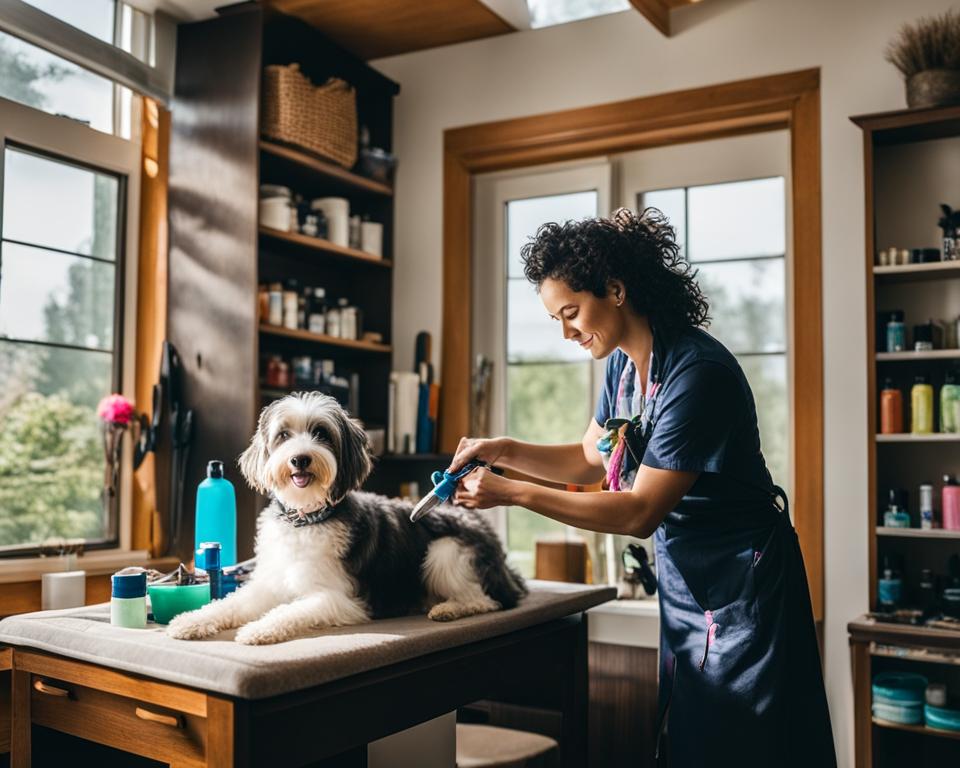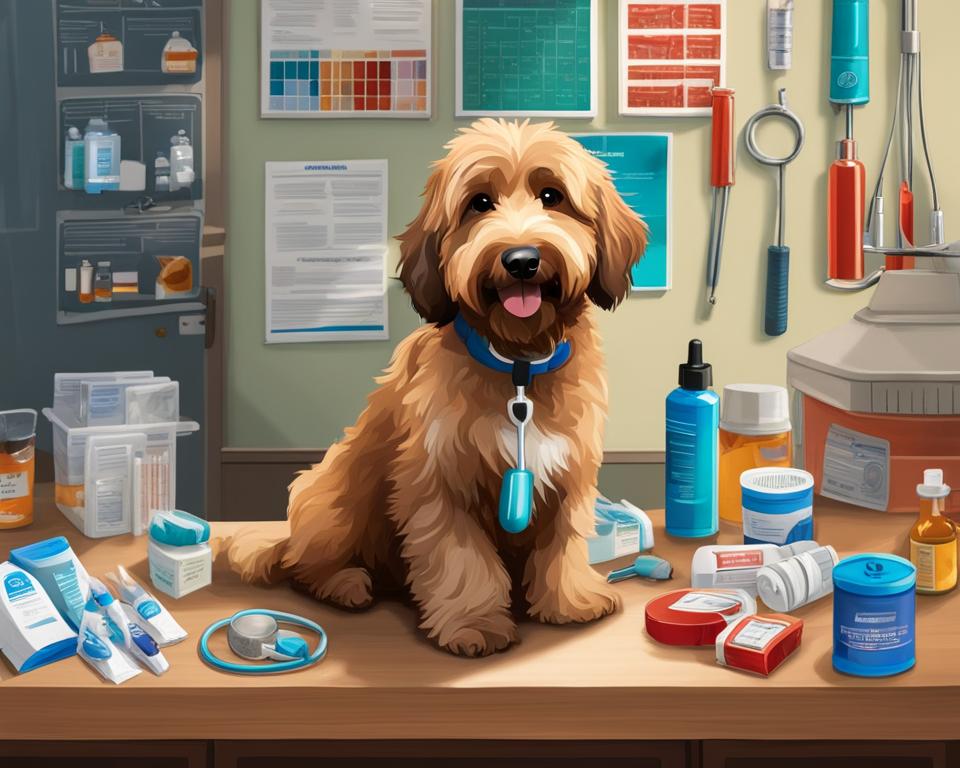The Aussiedoodle is a popular crossbreed between an Australian Shepherd and a Poodle. They come in various sizes and colors, and while some may be hypoallergenic, it’s not guaranteed. Aussiedoodles are known for their high trainability and require regular exercise to stay healthy.
Key Takeaways:
- Understanding the Aussiedoodle breed and its characteristics
- Importance of regular exercise and mental stimulation
- Feeding and nutrition guidelines for Aussiedoodles
- Common health issues and how to manage them
- Grooming tips and maintenance for Aussiedoodles
Caring for an Aussiedoodle
Proper care is essential to ensure the health and well-being of your Aussiedoodle. By following these tips, you can help keep your furry friend happy and healthy:
Diet and Nutrition
Feeding your Aussiedoodle a well-balanced diet is crucial for their overall health. Choose high-quality dog food that is specifically formulated for their size and age. Adult Aussiedoodles should be fed two meals a day, while puppies may require more frequent feedings. Monitor their food and water intake to prevent the risk of bloat, a potentially life-threatening condition.
Exercise and Mental Stimulation
Aussiedoodles are active and energetic dogs that require regular exercise and mental stimulation. Aim for at least an hour of physical activity each day, such as walks, runs, or playtime in a securely fenced area. Engage their minds with puzzle toys, interactive games, and obedience training to prevent boredom and destructive behavior.
Grooming and Maintenance
Aussiedoodles have a unique coat that requires regular grooming to keep it healthy and tangle-free. Brush their coat at least once a week to remove loose hair and prevent matting. Trim their nails regularly and check their ears for signs of infection. Bathing should be done as needed to keep their coat clean and shiny.
| Aspect of Care | Frequency |
|---|---|
| Feeding | Two meals a day for adults, more frequent for puppies |
| Exercise | At least an hour of physical activity each day |
| Grooming | Regular brushing, nail trims, and ear checks |
By providing proper nutrition, exercise, and grooming, you can ensure that your Aussiedoodle remains healthy, happy, and full of energy.
Aussiedoodle Health Issues
Aussiedoodles, being a crossbreed of Australian Shepherds and Poodles, may be prone to certain health issues. It is crucial for pet parents to be aware of these conditions to provide the best possible care for their beloved pets. Here are some of the most common health issues that can affect Aussiedoodles:
Thyroid Disease
Aussiedoodles, like their parent breeds, can be susceptible to thyroid disease. This condition occurs when the thyroid gland does not produce enough thyroid hormones, leading to various symptoms such as weight gain, fatigue, and skin problems. With proper diagnosis and medication, thyroid disease can be effectively managed, allowing Aussiedoodles to live happy and healthy lives.
Sebaceous Adenitis
Another health issue that Aussiedoodles may face is sebaceous adenitis. This is a skin condition characterized by inflammation of the sebaceous glands, resulting in dry, flaky skin and hair loss. Regular baths with gentle shampoos and the application of ointments recommended by a veterinarian can help manage sebaceous adenitis and keep your Aussiedoodle’s coat and skin in good condition.
Joint Dysplasia
Joint dysplasia is a common condition in both Australian Shepherds and Poodles, which can also affect Aussiedoodles. It refers to abnormal development or growth of the joints, leading to discomfort, pain, and decreased mobility. Mild cases of joint dysplasia can often be managed through exercise, a healthy diet, and joint supplements, while more severe cases may require surgical intervention to improve the dog’s quality of life.
Bloat
Bloat, also known as gastric dilatation-volvulus, is a potentially life-threatening condition that can affect Aussiedoodles. It occurs when the stomach fills with gas or fluid, leading to bloating and potentially twisting of the stomach. Immediate veterinary care is essential if you notice symptoms such as restlessness, unproductive vomiting, or a swollen abdomen. Bloat can be prevented by feeding small, frequent meals, avoiding strenuous exercise after meals, and keeping your Aussiedoodle calm and stress-free.
| Health Issue | Symptoms | Treatment |
|---|---|---|
| Thyroid Disease | Weight gain, fatigue, skin problems | Medication to manage hormone levels |
| Sebaceous Adenitis | Dry, flaky skin, hair loss | Regular baths, ointments prescribed by a veterinarian |
| Joint Dysplasia | Discomfort, pain, decreased mobility | Exercise, healthy diet, joint supplements, and in severe cases, surgery |
| Bloat | Restlessness, unproductive vomiting, swollen abdomen | Immediate veterinary care; prevention through small, frequent meals and avoiding strenuous exercise after eating |
What To Feed an Aussiedoodle
https://www.youtube.com/watch?v=DX8mLNe0bjA
Proper nutrition is essential for the health and well-being of your Aussiedoodle. Feeding them a well-balanced diet that meets their specific nutritional needs is crucial for their overall health. The diet of an Aussiedoodle should include vitamins, proteins, and fats to support their energy levels and promote optimal health.
When it comes to feeding an Aussiedoodle, it is important to consider their age, size, and individual needs. For growing Aussiedoodle puppies, a high-quality puppy food is recommended to support their growth and development. As they transition into adulthood, they can be gradually switched to an adult dog food that provides the necessary nutrients for their maintenance.
The amount of food to feed an Aussiedoodle depends on various factors, including their activity level, metabolism, and overall health. Consulting with a veterinarian can help determine the appropriate portion sizes and feeding schedule for your specific Aussiedoodle. It is important to monitor their weight and adjust their food intake accordingly to prevent obesity or undernourishment.
| Key Points | Details |
|---|---|
| Feeding Recommendation | Aussiedoodles should be fed a well-balanced diet that meets their nutritional needs. |
| Puppy Food | Puppy food should be provided for growing Aussiedoodles and transitioned to adult dog food after their first birthday. |
| Feeding Amount | The amount of food to feed an Aussiedoodle depends on their size, age, and overall health. Consult with a veterinarian for specific feeding guidelines. |
Remember to provide your Aussiedoodle with fresh water at all times and monitor their food and water intake. This will help minimize the risk of potential health issues such as bloat, which Aussiedoodles may be predisposed to. By prioritizing their nutrition and following best practices for their health care, you can ensure that your Aussiedoodle thrives and leads a happy, healthy life.
Aussiedoodle Behavior and Training Tips
When it comes to Aussiedoodles, understanding their behavior and providing proper training is essential for their overall well-being. These friendly and intelligent dogs thrive in an environment where they receive ample mental stimulation and positive reinforcement. Here are some essential tips to help you care for your Aussiedoodle:
Socialization from an Early Age
Start socializing your Aussiedoodle from a young age to ensure they get along well with other pets and children. Expose them to various environments, sounds, and experiences to build their confidence and reduce the likelihood of fear-based behaviors.
Mental and Physical Stimulation
Aussiedoodles are energetic dogs that require both mental and physical exercise to prevent boredom and destructive behaviors. Engage them in interactive play sessions, provide puzzle toys, and take them on daily walks or runs to keep them mentally and physically stimulated. Fun activities like agility courses and swimming can also help channel their energy in a positive way.
Positive Reinforcement Training
Aussiedoodles respond well to positive reinforcement training methods, such as clicker training. Reward good behavior with treats, praise, and affection. Consistency, patience, and using commands consistently are key to successful training. Basic commands like “stay” and “come” are essential to ensure their safety and obedience.
Professional Training Assistance
If you’re struggling with training or behavioral issues, consider seeking professional help. A professional dog trainer can provide guidance and tailored training plans specific to your Aussiedoodle’s needs. They can address any behavioral challenges and help you build a strong bond with your furry companion.
| Tips for Behavior and Training | Benefits |
|---|---|
| Start socializing from an early age | Ensures good behavior with other pets and children |
| Provide mental and physical stimulation | Prevents boredom and destructive behaviors |
| Use positive reinforcement training | Achieves obedience and strengthens the bond |
| Consider professional training assistance | Addresses behavioral challenges effectively |
Aussiedoodle Grooming Guide
Grooming is an important aspect of caring for your Aussiedoodle. Their unique coat types can vary from tightly curled to wavy, and each dog may have different grooming needs. Regular grooming not only keeps them looking their best but also helps maintain their overall health and hygiene.
One of the key grooming tasks for Aussiedoodles is regular brushing to prevent matting and tangles. Depending on the length and texture of their coat, they may require daily or weekly brushing. This helps remove loose hair, keeps the coat free from debris, and stimulates the skin’s natural oils.
In addition to brushing, regular trims are essential to keep their coat neat and prevent it from becoming too long or unruly. Trimming around the face, ears, and paws helps maintain their appearance and prevents discomfort or irritation. It’s recommended to seek professional grooming services or learn how to trim your Aussiedoodle’s coat properly.

Grooming Tips:
- Start grooming your Aussiedoodle from a young age to get them accustomed to the process.
- Use appropriate grooming tools such as a slicker brush, comb, and grooming scissors.
- Regularly check their ears for any signs of infection or excessive wax buildup. Clean their ears as recommended by a veterinarian.
- Keep their nails trimmed to a comfortable length to prevent overgrowth and potential injury.
- Bathe your Aussiedoodle as needed using a dog-friendly shampoo and conditioner, ensuring thorough rinsing to avoid skin irritations.
Grooming sessions also provide an opportunity to check for any abnormalities or health issues. Pay attention to their skin, eyes, and ears, looking for redness, inflammation, or anything that may require veterinary attention. By following a regular grooming routine and being attentive to their grooming needs, you can ensure your Aussiedoodle stays healthy, comfortable, and looking their best.
Aussiedoodle Considerations for Pet Parents
Aussiedoodles make wonderful pets for families who can provide the necessary care and attention they require. Before bringing an Aussiedoodle into your home, there are several important considerations to keep in mind:
Living Space:
Aussiedoodles are active and energetic dogs that thrive with plenty of exercise and mental stimulation. They need ample space to run, play, and explore. If you live in an apartment or a small home without a yard, you’ll need to ensure you have access to nearby parks or have enough time to take them for regular walks or trips to a dog-friendly area.
Grooming Needs:
Aussiedoodles have unique coats that require regular grooming to keep them healthy and looking their best. They have medium to long hair that can become matted and tangled if not properly cared for. Plan on regular brushing sessions and occasional trips to a professional groomer to keep their coat in top condition.

Training and Socialization:
Aussiedoodles are intelligent and eager to please, but they require consistent training and socialization from an early age. Start with basic obedience training and gradually introduce them to new experiences, people, and other animals. Positive reinforcement methods work best with Aussiedoodles, so be sure to reward them for good behavior.
Time and Commitment:
Adding an Aussiedoodle to your family requires a significant time commitment. They thrive on human companionship and need regular exercise, mental stimulation, and social interaction. If you have a busy lifestyle or travel frequently, an Aussiedoodle may not be the best choice for you.
By understanding these considerations and being prepared to meet the needs of an Aussiedoodle, you can provide a loving and fulfilling home for this intelligent and energetic breed.
Aussiedoodle FAQs
Are you considering getting an Aussiedoodle as a new furry family member? Here are some frequently asked questions about Aussiedoodle health care, care tips, and advice to help you make an informed decision.
1. How big do Aussiedoodles get and what is their lifespan?
Aussiedoodles come in two sizes: Miniature Aussiedoodles can weigh up to 30 pounds, while standard size Aussiedoodles can reach up to 70 pounds. On average, an Aussiedoodle’s lifespan is between 10-12 years.
2. How much do Aussiedoodle puppies cost?
The cost of an Aussiedoodle puppy can vary depending on factors such as the reputation of the breeder and location. It’s important to do thorough research and find a reputable breeder who prioritizes the health and well-being of their dogs.
3. What are some care tips and advice for Aussiedoodle owners?
When it comes to caring for your Aussiedoodle, regular exercise and mental stimulation are essential. These active and intelligent dogs require at least an hour of exercise every day to keep them happy and healthy. They also need a well-balanced diet approved by the Association of American Feed Control Officials (AAFCO) to support their growth and energy levels.
Additionally, grooming is an important aspect of Aussiedoodle care. Their unique coat types require regular brushing and trims to keep them looking their best. It’s also crucial to monitor their skin, eyes, and ears for any signs of infections or issues.
Remember, Aussiedoodles are generally friendly and make great companions when properly trained and socialized.
By understanding these FAQs and following the care tips and advice, you can provide your Aussiedoodle with a happy and healthy life.
FAQ
What is an Aussiedoodle?
An Aussiedoodle is a crossbreed between an Australian Shepherd and a Poodle.
How much do Aussiedoodles weigh?
Miniature Aussiedoodles can weigh up to 30 pounds, while standard size Aussiedoodles can weigh up to 70 pounds.
Are Aussiedoodles hypoallergenic?
Aussiedoodles may or may not be hypoallergenic, as it can vary depending on the individual dog.
How much exercise do Aussiedoodles need?
Aussiedoodles require at least an hour of exercise every day to meet their energy needs.
What health conditions are Aussiedoodles prone to?
Aussiedoodles can be prone to genetic health conditions such as thyroid disease, sebaceous adenitis, joint dysplasia, and bloat.
What should I feed my Aussiedoodle?
Aussiedoodles should be fed a well-balanced diet approved by the Association of American Feed Control Officials (AAFCO) to support their growth and energy levels.
How often should I feed my Aussiedoodle?
Full-grown Aussiedoodles should be fed two meals a day, while puppies need to eat more frequently.
How do I groom an Aussiedoodle?
Aussiedoodles have unique coat types that require regular grooming. Regular brushing and trims are necessary to keep their coats looking their best.
Are Aussiedoodles good with children and other pets?
Aussiedoodles can get along well with other pets and children when properly trained and socialized.
What is the average lifespan of an Aussiedoodle?
The average lifespan of an Aussiedoodle is between 10-12 years.
How much does an Aussiedoodle puppy cost?
The cost of an Aussiedoodle puppy can vary depending on factors such as breeder reputation and location.

Leave a Reply